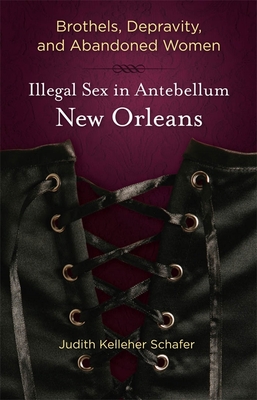Brothels, Depravity, and Abandoned Women: Illegal Sex in Antebellum New Orleans

Brothels, Depravity, and Abandoned Women: Illegal Sex in Antebellum New Orleans
When a priest suggested to one of the first governors of Louisiana that he banish all disreputable women to raise the colony's moral tone, the governor responded, "If I send away all the loose females, there will be no women left here at all." Primitive, mosquito infested, and disease ridden, early French colonial New Orleans offered few attractions to entice respectable women as residents. King Louis XIV of France solved the population problem in 1721 by emptying Paris's La Salpêtrière prison of many of its most notorious prostitutes and convicts and sending them to Louisiana. Many of these women continued to ply their trade in New Orleans.
In Brothels, Depravity, and Abandoned Women, Judith Kelleher Schafer examines case histories from the First District Court of New Orleans and tells the engrossing story of prostitution in the city prior to the Civil War. Louisiana law did not criminalize the selling of sex until the Progressive Era, although the law forbade keeping a brothel. Police arrested individual public women on vague charges, for being "lewd and abandoned" or vagrants. The city's wealthy and influential landlords, some of whom made huge profits by renting their property as brothels, wanted their tenants back on the streets as soon as possible, and they often hired the best criminal attorneys to help release the women from jail. The courts, in turn, often treated these "public women" leniently, exacting small fines or sending them to the city's workhouse for a few months. As a result, prosecutors dropped almost all prostitution cases before trial.
Relying on previously unexamined court records and newly available newspaper articles, Schafer ably details the brutal and often harrowing lives of the women and young girls who engaged in prostitution. Some watched as gangs of rowdy men smashed their furniture; some endured beatings by their customers or other public women enraged by fits of jealousy; others were murdered. Schafer discusses the sexual exploitation of children, sex across the color line, violence among and against public women, and the city's feeble attempts to suppress the trade. She also profiles several infamous New Orleans sex workers, including Delia Swift, alias Bridget Fury, a flaming redhead with a fondness for stabbing men, and Emily Eubanks and her daughter Elisabeth, free women of color known for assaulting white women.
Although scholars have writte
PRP: 185.54 Lei
Acesta este Prețul Recomandat de Producător. Prețul de vânzare al produsului este afișat mai jos.
166.99Lei
166.99Lei
185.54 LeiLivrare in 2-4 saptamani
Descrierea produsului
When a priest suggested to one of the first governors of Louisiana that he banish all disreputable women to raise the colony's moral tone, the governor responded, "If I send away all the loose females, there will be no women left here at all." Primitive, mosquito infested, and disease ridden, early French colonial New Orleans offered few attractions to entice respectable women as residents. King Louis XIV of France solved the population problem in 1721 by emptying Paris's La Salpêtrière prison of many of its most notorious prostitutes and convicts and sending them to Louisiana. Many of these women continued to ply their trade in New Orleans.
In Brothels, Depravity, and Abandoned Women, Judith Kelleher Schafer examines case histories from the First District Court of New Orleans and tells the engrossing story of prostitution in the city prior to the Civil War. Louisiana law did not criminalize the selling of sex until the Progressive Era, although the law forbade keeping a brothel. Police arrested individual public women on vague charges, for being "lewd and abandoned" or vagrants. The city's wealthy and influential landlords, some of whom made huge profits by renting their property as brothels, wanted their tenants back on the streets as soon as possible, and they often hired the best criminal attorneys to help release the women from jail. The courts, in turn, often treated these "public women" leniently, exacting small fines or sending them to the city's workhouse for a few months. As a result, prosecutors dropped almost all prostitution cases before trial.
Relying on previously unexamined court records and newly available newspaper articles, Schafer ably details the brutal and often harrowing lives of the women and young girls who engaged in prostitution. Some watched as gangs of rowdy men smashed their furniture; some endured beatings by their customers or other public women enraged by fits of jealousy; others were murdered. Schafer discusses the sexual exploitation of children, sex across the color line, violence among and against public women, and the city's feeble attempts to suppress the trade. She also profiles several infamous New Orleans sex workers, including Delia Swift, alias Bridget Fury, a flaming redhead with a fondness for stabbing men, and Emily Eubanks and her daughter Elisabeth, free women of color known for assaulting white women.
Although scholars have writte











